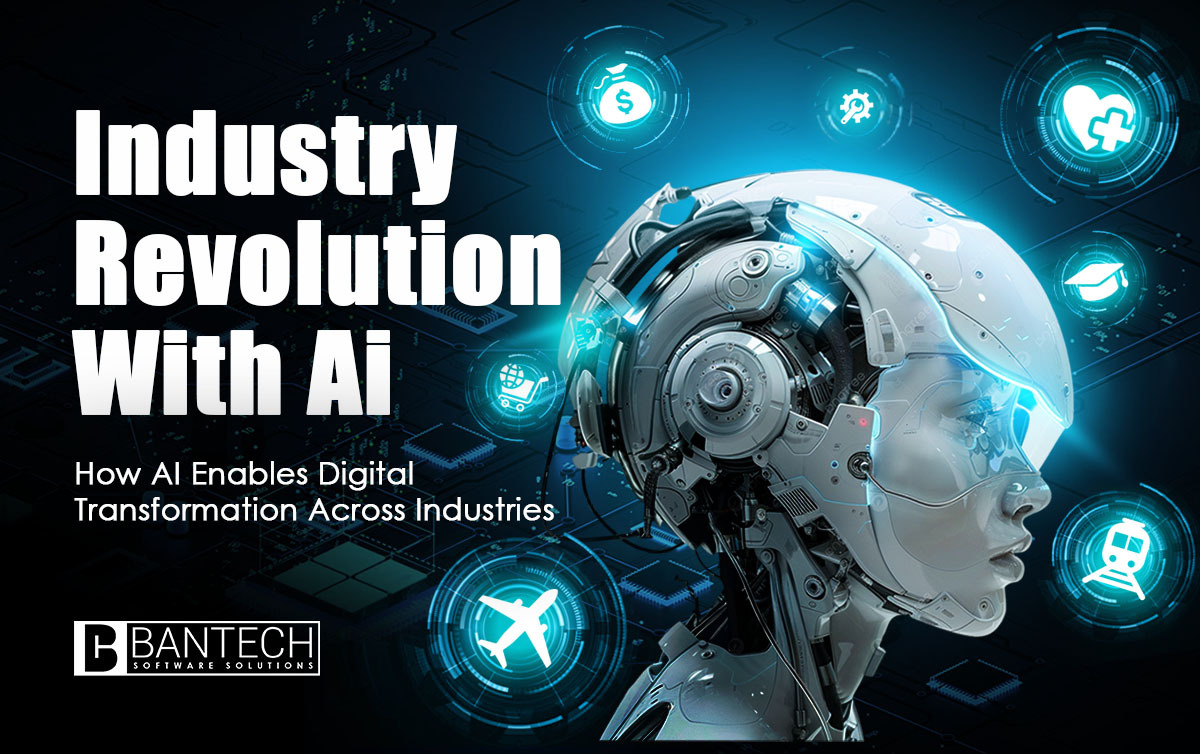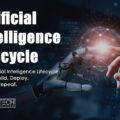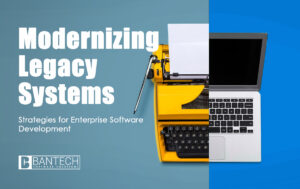How AI Enables Digital Transformation Across Industries
AI is revolutionizing a number of industries, including manufacturing, retail, healthcare, and finance. It’s improving operations, assisting companies in making smarter choices, and creating opportunities for fresh concepts. AI, for instance, aids medical professionals in making more precise diagnoses and offering individualized care. It greatly improves the efficiency of risk management and fraud detection in the financial industry. In the retail industry, AI helps predict product demand and offers customers individualized shopping experiences and in manufacturing, AI helps in increasing supply chain efficiency and helps forecast when machinery may require maintenance.
Growth of AI By 2030
Industry Transformation: How AI Is Acting as a Catalyst for Digital Transformation
AI in Healthcare
- Improving diagnosis and therapy: By evaluating enormous volumes of patient data to increase diagnostic precision and suggest individualized treatment regimens based on unique traits, artificial intelligence (AI) in healthcare improves diagnosis and therapy. In the end, this results in better illness treatment and earlier detection.
- Enhancements in operational efficiency and administrative effectiveness: Predictive analytics optimizes resource allocation and inventory management, increasing overall efficiency and lowering administrative burdens on healthcare providers. Artificial Intelligence (AI) streamlines healthcare operations by automating tasks like appointment scheduling and billing through natural language processing.
- Patient care and personalized medicine: By evaluating genetic information to customize treatment regimens and forecast results, AI makes personalized medicine possible. Chatbots and virtual health assistants improve patient engagement and treatment adherence by offering individualized patient care experiences through remote monitoring and real-time advice.
AI in Banking and Finance
AI in banking and finance makes use of cutting-edge technologies that optimize wealth management, boost operational effectiveness, increase decision-making, and provide individualized consumer experiences. Financial institutions may efficiently address changing market expectations by using AI to improve processes, reduce risks, and develop services.
- Cybersecurity and Fraud Detection: Because AI regularly monitors transactions to identify odd trends that can point to fraud, it plays a critical role in the financial industry. Financial organizations may better safeguard their clients and assets by using machine learning algorithms, which can evaluate enormous volumes of data in real-time to spot fraudulent activity.
- Client support and chatbots: Artificial intelligence (AI)-driven chatbots revolutionize banking customer service by offering prompt answers to questions, account details, and transaction histories. These bots can comprehend and react to client inquiries with accuracy thanks to natural language processing (NLP), which increases customer satisfaction and cuts down on wait times.
- Personalized Financial Services: AI may provide investment recommendations, product recommendations, and financial advice that is specific to each customer’s requirements and objectives by evaluating consumer data and behavior.
- Risk management: AI improves risk assessment by forecasting possible hazards by examining historical data, financial information, and market movements. This lessens possible losses and enables financial institutions to make more informed judgments.
- Algorithmic Trading: Using enormous databases to spot market trends and opportunities, AI-driven algorithms execute transactions quickly and in large quantities. As a result, trading operations are more profitable and efficient.
- Data Analysis and Insights: Artificial intelligence (AI) systems process and analyze massive information to produce actionable insights that assist financial institutions improve client experiences, streamline processes, and spot new business prospects.
AI in E-Commerce
By improving consumer experiences, optimizing processes, and increasing revenues, artificial intelligence (AI) is completely changing the e-commerce sector. Here are some major ways AI is influencing the e-commerce (online retail) industry:
- Personalized Shopping Experience: To provide tailored product recommendations, AI algorithms examine consumer data such as browsing history, purchase trends, and preferences. This boosts client happiness and enhances the possibility of conversions.
- Virtual assistants and chatbots: AI-driven chatbots offer immediate customer service by responding to questions, assisting customers with the purchasing process, and even managing order tracking. Their round-the-clock support enhances customer service and speeds up response times.
- Inventory Management: By anticipating demand, keeping an eye on stock levels, and automating reordering procedures, AI improves inventory management. This lowers the possibility of overstocking or stockouts by guaranteeing that popular items are always available.
- Dynamic Pricing: Real-time product price adjustments are made by AI-driven dynamic pricing algorithms in response to variables including consumer behavior, competition, and demand. This offers competitive and appealing prices, maximizing sales and profits.
- Analytics and Customer Insights: Artificial intelligence (AI) systems analyze enormous volumes of data to produce insightful information about the preferences and behavior of customers. Retailers can utilize this data to better target their marketing campaigns, expand their product lines, and improve the general customer experience.
- Supply Chain Optimization: By forecasting demand, controlling logistics, and enhancing delivery routes, artificial intelligence (AI) optimizes supply chain operations. As a result, shipping becomes quicker and more effective, which lowers expenses and raises customer satisfaction.
AI is projected to handle 80% of all customer interactions by 2030.
AI In Manufacturing
The manufacturing sector is undergoing a significant transformation prompted by artificial intelligence (AI), which is increasing productivity, improving quality, and cutting prices. AI is transforming manufacturing in significant ways, lets dive into them:
- Predictive maintenance: Systems driven by artificial intelligence (AI) examine data from machinery and equipment to anticipate any malfunctions before they happen. This lowers maintenance expenses, increases equipment lifespan, and decreases downtime.
- Quality Control: During the manufacturing process, AI systems check items for flaws and irregularities using computer vision and machine learning. This lowers the quantity of faulty products that make it to market and guarantees high standards of quality.
- Supply Chain Optimization: By forecasting demand, controlling inventory, and enhancing logistics, artificial intelligence (AI) optimizes supply chain operations. This results in shorter lead times, cost reductions, and more effective production planning.
- Automation and Robotics: AI-driven automated systems and robots do dangerous and repetitive tasks quickly and precisely. This improves worker safety, lowers human error, and boosts production.
- Process Optimization: AI systems examine production procedures to find inefficiencies and recommend enhancements. This enhances overall efficiency, minimizes waste, and optimizes production operations.
- Energy Management: AI systems track and optimize energy use in factories, lowering expenses and consumption. This supports environmentally friendly and sustainable production methods.
- Supply Chain Risk Management: By evaluating data from several sources, including market trends, weather forecasts, and geopolitical events, artificial intelligence (AI) assists in identifying and reducing supply chain risks. This guarantees a supply chain that is more robust and dependable.
AI in Education
By improving learning experiences, increasing administrative effectiveness, and personalizing education, artificial intelligence (AI) is revolutionizing the educational landscape. The following are some major ways AI is influencing education:
- Personalized Learning: To develop individualized learning paths, AI-powered systems examine each student’s learning preferences, strong points, and areas for improvement. This guarantees that every student gets individualized guidance and assistance, improving their academic achievement.
- Intelligent Tutoring Systems: AI-powered tutoring programs help students in real time by answering their queries, giving them clarifications, and helping them work through challenging issues. By adjusting to each student’s unique needs, these systems offer a more engaging and encouraging educational environment.
- Automated Assessment and Grading: AI evaluates tests, quizzes, and assignments to automate the grading process. This lessens the workload for teachers, freeing them up to concentrate more on instruction and giving each student individualized feedback.
- Administrative Efficiency: AI simplifies administrative duties like resource management, scheduling, and enrollment. As a result, educational institutions operate more efficiently and staff members have more time to support and engage students.
- Early Intervention: AI programs keep an eye on students’ interest and performance to spot those who could be at risk of falling behind. Early warnings and interventions allow teachers to address problems quickly and give struggling kids extra help.
- Data-Driven Insights: AI examines educational data to offer insights about teaching methods, curriculum efficacy, and student performance. By using this information, educators can make better judgments and raise the standard of instruction.
AI in Transportation and Logistics
The transportation and logistics sector is changing as a result of artificial intelligence (AI), which is bringing about notable improvements in productivity, security, and creativity. The following are some significant ways AI is changing the world:
- Predictive Maintenance: AI programs examine sensor data from automobiles and machinery to forecast maintenance requirements. This proactive strategy lowers downtime, prolongs asset lives, and helps avoid unplanned breakdowns.
- Route Optimization: By examining traffic patterns, meteorological conditions, and other factors, AI-powered systems optimize delivery routes. As a result, delivery dependability is increased, journey time is decreased, and fuel consumption is decreased.
- Autonomous Vehicles: Artificial intelligence is used by self-driving cars, trucks, and drones to navigate and make choices in real time. The ability of these self-driving cars to run constantly boosts productivity and lowers labor expenses in logistics processes.
- Demand Forecasting: AI-powered demand forecasting algorithms accurately estimate what customers will require. By doing this, businesses may better manage their inventory, which lowers the likelihood of stockouts and overstocks and improves supply chain efficiency.
- Warehouse Automation: Picking, packing, and sorting are all done quickly and precisely by AI-powered robots and automated systems. This improves overall warehouse operations efficiency, lowers human error, and boosts output.
- Supply Chain Optimization: By forecasting demand, controlling inventory, and enhancing logistics, artificial intelligence (AI) optimizes supply chain operations. As a result, delivery is quicker and more effective, which lowers expenses and raises customer satisfaction.
- Customer Insights: AI uses data analysis to offer insightful information on the preferences and behavior of customers. Businesses can use this data to better serve their clients, find new markets, and customize their offerings.












